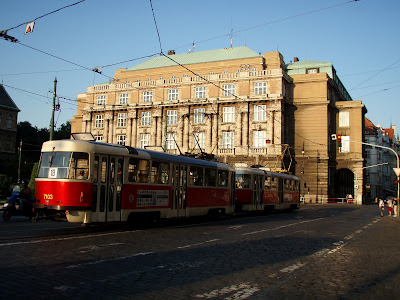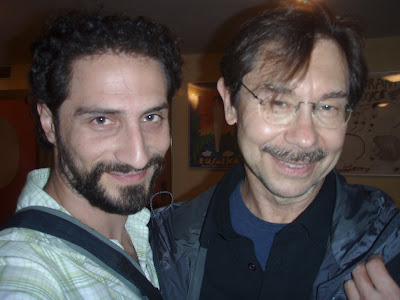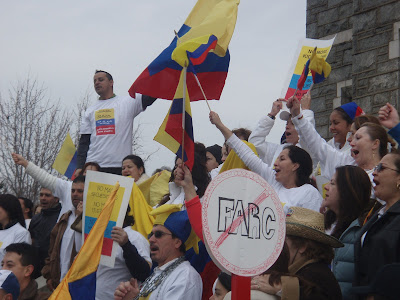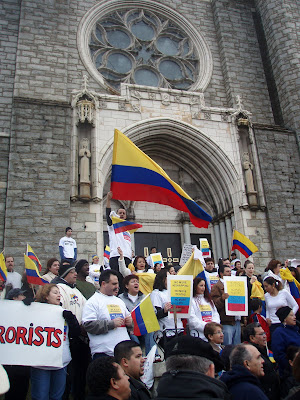 From left to right: Sebastián Pineda, R. H. Moreno Duran, Eduardo Bechara Navratilova y Germán Espinosa.
From left to right: Sebastián Pineda, R. H. Moreno Duran, Eduardo Bechara Navratilova y Germán Espinosa.
It poured in Bogota. Thunder and lightning fell, producing roars and shines. I took Thirteenth Avenue and went down Eightieth Street, passing in front of the National Heroes’ Monument. The water rose half way up the hubcaps. I made a left onto Caracas Avenue and drove south through the devilish traffic, limited to the movement of the urban snake. I reached Los Martires Park one hour later, just beside the National Recruitment Battalion where I had served a year of military service. The site took me back fourteen years to those days. Up Twelfth Street, garbage was scattered around the neighborhood of houses with discolored facades and crumbling store fronts. Some bums took shelter from the rain under the entrance of San Jose hospital, a republican building with high columns, wooden windows and concrete terraces. Rain drops burst on the windshield. I parked and went out into the rain. The street was one big pool. The water seeped through my sweater and reached my skin with a frosty sensation. I took a few steps and it got inside my shoes. By the time I arrived at the entrance, my socks were soaked. I walked towards the lobby dripping.
“I’m here to see Germán Espinosa,” I told the nurse. She looked at some papers and directed me to intensive care.
My shoes squished. I went up some stairs and walked through some peeled wall corridors until I found Adrián.
“Nobody knows what’s going on with him,” he said with cloudy eyes. “They did an exploratory surgery on him, and now he’s in a coma with his belly half-open.” The bad news and Bogotá’s cold weather on my wet clothing made me shiver. “Father hadn’t pissed in seventy two hours, and had a pain in his bladder. They operated on him without knowing what he really had, and now they’re telling us that it’s an infection in his intestines. They’re going to leave his belly open until it clears up.”
Josefina was in the waiting room covering her face with her hands. At the sound of my shoes she lifted her face and I could see her crying eyes, her fallen cheek bones.
“Come and wait with us,” she said pointing at a seat. Plastic flowers stood on a center table.
I kissed her and greeted León who was wearing his Navy Officer uniform with blue bordered trims. His wife Lida held his hand. I sat where Josefina had told me. The place was somber. A couple of nurses giggled in a nearby counter.
Sebastián arrived from the restroom a moment later. He had introduced me to them some years ago, when we studied literature in college. With time it became a habit to meet with Germán and Josefina at the Jiménez Avenue coffee shop where we spoke about literature and politics.
The Master, as Sebastián used to call him in homage for having written the novel La tejedora de coronas —considered by many as the most important Colombian novel of the XXth century after One Hundred years of solitude— was a grumpy man filled with a deep sense of pride and honor. He could stop talking to old friends if they expressed negative comment about something he had written.
Sebastián sat and leaned towards me. He spoke in my ear. “These sons of bitches opened him up without any need. Can you believe it?”
“Do they know who he is?”
“They didn’t have a clue. I had to warn them that if the Master dies they’re responsible for the death of one of the most important writer in Colombia, if not the first.”
The fabric of the seat I was using was raggedy, the floor was dirty, the hospital’s general appearance was shitty. Their life had been difficult all along. The whole family had lived in a hotel room for over a year, as Germán and Josefina had no money to afford an apartment. Their parents ended up paying for Adrian’s and Leon’s education, as German had struggled in making a living out of writing.
Josefina was uneasy. She went to ask if the doctors had any news and then came back in disappointment. She didn’t say much, but I could tell her life would break down if something happened to him. She cracked down in tears and cleaned them with a tissue. Leon caressed her head. Lida stood in silence.
The image of the sensual Genoveva Alcocer, the character of La tejedora de coronas, came to my mind. I imagined her taking baths under an opened Caribbean sky. Was Josefina the muse that had inspired Germán? If so, she was weeping for Federico, the young man that had discovered a planet and named it after her on a coconut beach beside the blue colored sea of Cartagena de Indias. “Planeta Genoveva,” he called it.
Writers use their lovers as muses. I’d been inspired by the girl I ended up calling Mantis, to write a novel of a young man that killed his former lover. It had been my thesis when graduating from law school.
Adrian walked up and down the hallway with his closed fists over his mouth. The tips of his raincoat fluttered on each turn. When I left the hospital it was still raining. I drove home remembering the day I’d run away from the Mantis. A woman I would have given my soul for. She still wondered in my mind, although she’d been out of my life for years.
I returned with my dad on the weekend. The morning was cloudy, but it wasn’t raining. Germán had awakened, but his belly was still open. The infection hadn’t lessened. We went to a nearby bakery on a street full of holes and puddles, where the thick smoke from old buses dirtied the air. In a corner, against the hospital wall, a man with mutilated legs begged for money.
“You die and you take nothing with you,” he said, shaking the trimmed base of a plastic bottle. Coins rattled inside.
We entered a narrow bakery and asked for some almojábanas. An employee wearing a red uniform with a white apron brought them to the table.
“We need to have faith in his recovery,” dad said. Adrián, León, and Lida nodded. Josefina dazed. Was she imagining Federico? The young man Genoveva had lost by the sword of a French pirate. Her eyes were swollen. The thought of losing her husband at any moment must have made those days the most difficult of her life.
“The Master is already speaking,” Sebastian told me some days later.
I returned with the hope of seeing him. The day was bright and the sky appeared clean. I parked beside a public school. Some girls dressed up in a white and blue checkered uniform spoke among them. I entered the crumbling hospital and found them.
“His infection has lessened, but now they are saying that he has pneumonia.” Josefina told me. Her skin was pale and she was breathing heavily. I walked her through a corridor that led to a small cement terrace, where smoke with the smell of roasted meat was expelled from a chimney. She lit a cigarette. Her eyes were dry, as if they’d run out of tears. For a moment I thought she was ready to surrender.
“It burns me to see him like this!” she said looking at the floor. She smoked frantically. A yellowish color, like faded paper extended through her fingers to the edge of her nails. She lit a new cigarette and then another one as if the world was falling down. We walked back to where Sebastián and Adrian awaited.
“The Master is drugged but awake.” Sebastián said.
“Do you want to see him?” Josefina asked. I entered into the room. He was lying in the bed. A plastic curtain attached to a high beam isolated his abdomen from the environment. “Go close,” she said.
I walked toward him in shock. His skeleton could be seen below his skin. His long beard shone in his cadaverous face, skewed towards one side like a dying bird’s. His slightly opened eyes focused me. His mouth began to move with effort. I leaned close to him to hear what he was saying.
“I’m bored; get me out of here,” he whispered. He was comical even in the verge of dying.
Walking out we ran into a doctor and a group of students from a medical school. My eyes made contact with those of a beautiful student. She looked away.
“These fuckers are using the Master as a guinea pig,” Sebastián said looking at the group that surrounded the bed. Josefina sat in the waiting room and covered her face with her hands. Genoveva Alcocer came back to me. She was being raped by the French pirate, the same man that had previously killed Federico before they could even kiss. Had Germán created her as a premonition of love, life and pain, as Shakespeare had with Romeo and Juliet?
Sebastián called me some weeks later telling me Germán had been discharged. I visited his apartment with Dad. Josefina received us with a hug. She was radiant. Her eyes were wide open. She seated us and knocked on Adrián’s door. Some of her oil canvas paintings hung in the small living room, signed and dated some decades ago. An old wall clock told the time in Roman numerals. 10:10 a.m. I got distracted looking at the pendulum movement of the golden second hand, until Dad pointed to an ash tray filled with cigarette butts in the center table.
“Behind a great character there is always a common man,” he said.
Adrian came out with a clouded look, wearing a dressing gown over his pajamas. “He’s better, but he doesn’t want to do the exercises,” he told us pressing the palms of his hands into his eyes.
After some minutes a door opened. I heard him speak with a low voice. It was far from the booming tone he used in heated discussions. He walked towards us supporting his body with a walker. He sat his thin body slowly in the sofa. He smiled and for a moment I seemed to see in his face the expressions of a boy. He took out a pack of cigarette from the pocket of his gown and lit one. In the bottom of his eyes I saw the strong and determined man that I knew before.
“Master, you’re smoking?” I asked.
“There’s nothing like doing the things you like,” he answered blowing smoke out with pleasure. He took the lighter toward Josefina. She inhaled and the tip of her cigarette lit with a burning color.
I called them a couple of times to see how he was doing. Josefina told me Germán was writing again. He had gained some pounds and they had both returned to going to the Avenida Jiménez coffee shop. The routine of their lives was slowly being reestablished.
We organized a get-together at our place. Germán’s weight had risen to normal. He looked energetic, talked loudly, smoked and drank whisky sitting on the edge of the living room couch with his back straightened. I put on Jorge Negrete’s CD and we heard the first notes of “Me he de comer esa tuna.” He took a deep breath, waited for an instant and sang with a tone that resonated perfectly with dad’s voice. “Dicen que soy hombre malo, malo y mal averiguado, dicen que soy hombre malo, malo y mal averiguado; por que me comí un durazno, porque me comí un durazno, por que me comí un durazno, de corazón colorado…”. He glanced at Josefina broadening his chest and raising his chin. She looked back at him, tilting her head as if they were the same young couple that had married more than forty years ago. Sebastian sang with exaggerated gestures. Adrian smiled and sang while seeing his parents happy.
“Alvaro, there’s nothing like love,” he said sipping his whisky. Germán was a melodramatic man, but that made part of his personality. In time he’d come to look as some of the characters he’d created. He left the glass in the central table, put one hand over the handle of the cane, and intertwined the other one with Josefina’s. She didn’t speak much but had a permanent smile. Her cheek bones stood out on her face.
“Germán, for the happiness of having been happy,” father said raising his glass.
We drank and sang until the night burned its last moments.
Germán’s health problems seemed forgotten until I received a call from Sebastián. “There’s bad news,” he said with a serious voice. “Miss Josefina died yesterday from a heart attack.”
Dad went with me to the wake. We arrived at 9:00 a.m. at the Infantry Battalion, where a soldier inspected the underside of our car with a mirror. Another one searched the interior with the aid of a German shepherd who sniffed the front and back seats. I opened the trunk and the dog passed his snout over it. The soldier’s boots had the American shine just as I remembered it. He wore the green suit tucked at the edge of the black cartridge holders. The retractable-butt Galil rifle was mounted on his shoulder with the strap stretched over his chest as required. His Military Police helmet had some scratches on the white painting strap. A sergeant in the guard allowed our entry once the soldier gave the clearance.
We parked on the opposite side of the drill square, where I had prayed to defend the country in 1992. A Colombian flag fluttered in the wind, over the monument of the heroes fallen in combat. A gate separated the battalion from the Seventh Avenue, where cars passed at full speed. Several sentries kept guard in their various sentry boxes.
On the other side of the Avenue, the cavalry battalion stood against the eastern hills of the city. The sky was cloudy. Some tanks guarded the premises showing their canyons in wartime against the FARC.
What was going to happen now that Genoveva had died before Federico?
Nobody knew anything about her in the chapel. We waited. A man wearing a Navy uniform came in and addressed us as Leon’s friend. “Who would have thought she would go before him. The pain she went through in German’s illness killed her,” he said pulling his uniform sleeves. Seeing him on the verge of dying could have showed her how lonely she would have been without the man that had named a planet after her. Now she was alive in his book.
The Master entered with his family. He wore a red necktie, a white shirt, a shiny black suit with a handkerchief in his front pocket, and a long overcoat that made him look like a man of a past epoch.
His face was perfectly shaved in the cheeks and the edges of his well-trimmed beard. His wet hair in place, a serene look and the slow movements that he used in every one of his actions gave him the appearance of a man beyond good or bad.
“Germán, I’m so sorry,” father said embracing him.
“I know, Alvaro; I know.”
I gave him my condolences and embraced him. The wake room remained closed. We sat around a wooden table waiting for the coffin to arrive. It was a simple place with a bronze crucifix nailed to a white wall. Germán put the cane between his legs, supporting his hands on it, one over the other. He remained like that for a while, until he took out a cigarette and lit it.
“My life ends here. I am going to drink myself to death,” he said shrugging his shoulders.
A red rim encircled his eyes. The cigarettes and liquor on his breath reached me like a wave of sadness and desolation. His dry lips made a contrast with his smooth and pale skin.
He took the cigarette to his mouth and inhaled loosing his eyes into space. The desolation chewed him from top to bottom. He finished the cigarette and pulled out another one that he lit with the smoky butt of the first. The same yellowish color that Josefina wore in her fingers, extended up to the edge of his nails. How many millions of cigarettes had witnessed their passion? He smoked half a pack lighting one after another.
“There’s nothing left but suicide,” he mourned.
Lida brought him coffee. He put his hand inside the overcoat pocket and pulled out a medium bottle of Old Par that he used to liven up the drink. He drank a little to reduce the coffee-level and filled it up with whisky. He then added some to mine.
“Drink with me. She was my woman since she was nineteen.”
Sebastian called my cell phone. “I’ll be there in a while. Johann Rodríguez Bravo and I stayed till dawn with him drinking whisky.”
The coffin arrived some time later. Elder politicians and writers came by and he greeted them in pain.
“Life no longer has any sense. None!” he repeated.
He kept drinking until he appeared delirious. People do strange things when loosing their love ones. I’d written a six hundred page novel after the Mantis was no longer a part of my life.
I went to the mass the following day. There weren’t more than 20 people. On my way out I greeted Luz Mary Giraldo, who told me that in the three hours she’d been with him, nobody else had come to visit. I also greeted Jorge Franco, whom I had not seen since the reception we’d gone to in the French Ambassador’s house, where Germán had been granted the Chevalier des Arts et des Lettres medal for writing La tejedora de coronas.
It started to rain. I followed the funeral caravan in my car through the congested 116th Street and then on the freeway. I remembered Josefina smiling in our living room. Happiness shinning in her eyes. How unexpected death is, as sudden as the arrival of the pirate ships to Cartagena.
The rain stopped when we were reaching The Gardens of Peace, although a thin mist persisted. I got out gloomy and caught up with Leon and Lida in front of the crematorium, where a high structure is erected as a monument to the deceased. A rat lay dead in the entrance of the garden.
“Don’t look at it!” Leon told his wife.
We walked on the wet grass among the tombstones. A scent of wet earth could be smelled in the atmosphere. Bogotá’s savannah appeared with all its fertility, surrounded by trees, flowers and green hills. In a neighboring funeral some mariachis sang rancheras dressed in gaudy suits, designed with chamois openwork and stamped metal sets of buttons, playing vihuelas, guitars, violins and trumpets. A couple of them sang with microphones in their hands under their wide wing Mexican hats.
Josefina’s tomb was some yards away. Germán supported his hands on the cane beside the rectangular grave dug in the ground. León and Lida stood beside him hooking his arms. A priest dressed in a white cassock with an embroidered cross that glittered in the center of his chest, gave a sermon. His words clashed with the noisy ranchera songs, cries and tearing shouts that the neighboring funeral produced. By now, she should have met with Genoveva. They would both wait for Germán as one single person, in a place where their planet shone at dusk over the crispy ocean.
The coffin was lowered. I embraced Adrian passing my arm over his back. A man threw a pair of floral crowns over it. The grave diggers let the soil fall with pieces of fresh clay on it. Genoveva was leaving this world but Planeta Genoveva still existed. It existed in me, in Sebastian and in the world of many other readers.
“Yo sé bien que estoy afuera, pero el día en que yo me muera, se que tendrás que llorar. Llorar y llorar,” the mariachis sang. A heart rending shout came from the neighboring funeral. Adrian’s knees seemed to tremble. “…con dinero y sin dinero hago siempre lo que quiero, y mi palabra es la ley, no tengo trono ni reina, ni nadie que me comprenda, pero sigo siendo El Rey…” they sang.
“How can this be? How can this be? How can this be?” a woman shouted.
The mist was fading. Some tender rays of light went through the clouds painting a vertical set of lines that came down over the savannah.
I approached Germán. He continued between his son and his daughter-in-law. He lifted his eyes from the tomb and dazed. Was he imagining the moment he would reunite with Genoveva?
“I’m so sorry, Master, I’m so sorry.”
“Thanks for your words,” he answered with fallen eyelids “but you’re mourning a ghost.”




































